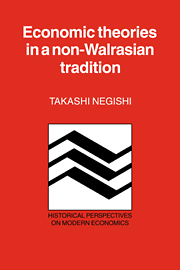Book contents
- Frontmatter
- Contents
- Preface
- 1 Anti-neoclassical or non-Walrasian economic theories
- Part I Increasing returns and diminishing cost
- Part II Wages and profit
- 6 Conditions for the wages fund doctrine and Mill's recantation of it
- 7 Marx and exploitations in production and in circulation
- 8 Marx's dichotomy between exploitation and redistribution of surplus products
- 9 Böhm-Bawerk and the positive rate of interest in a stationary state
- Part III International trade and investment
- Part IV Markets and money
- Notes
- References
- Author index
- Subject index
6 - Conditions for the wages fund doctrine and Mill's recantation of it
from Part II - Wages and profit
Published online by Cambridge University Press: 21 September 2009
- Frontmatter
- Contents
- Preface
- 1 Anti-neoclassical or non-Walrasian economic theories
- Part I Increasing returns and diminishing cost
- Part II Wages and profit
- 6 Conditions for the wages fund doctrine and Mill's recantation of it
- 7 Marx and exploitations in production and in circulation
- 8 Marx's dichotomy between exploitation and redistribution of surplus products
- 9 Böhm-Bawerk and the positive rate of interest in a stationary state
- Part III International trade and investment
- Part IV Markets and money
- Notes
- References
- Author index
- Subject index
Summary
Conditions for the relevancy of the wages fund doctrine, prerequisites for the predetermined wages fund, are not very unrealistic in a certain stage of economy where agriculture is predominant and the rate of wage is at a level not far from that of subsistence. These assumptions lost their realism as the economy developed, so that manufactures predominate over agriculture, agriculture itself is highly artificialized, and distinct consumption patterns between classes are not observed. Wages fund doctrine surely played some historical roles, but now it has almost played them out.
Recall that according to Bronfenbrenner (1971), however, outmoded ideas are never definitely displaced in economics. “To throw out the wages fund theory in toto is to cut oneself off from the key to the meaning of real capital that it furnished. It was a bad theory of wages, but it had the ingredients of a good theory of capital” (Blaug 1978, p. 196). Hicks (1977, pp. 149–65) emphasized the importance of the fundist theory of capital (capital is a fund, a sum of values) of Jevons and Böhm-Bawerk against the neoclassical materialist theory (capital consists of physical goods) with respect to social accounting and economic planning. It is worth considering, therefore, under what conditions we can find “the wage-fund doctrine, properly stated, not ‘wrong’ logically” (Schumpeter 1954, p. 669).
- Type
- Chapter
- Information
- Economic Theories in a Non-Walrasian Tradition , pp. 59 - 71Publisher: Cambridge University PressPrint publication year: 1985

